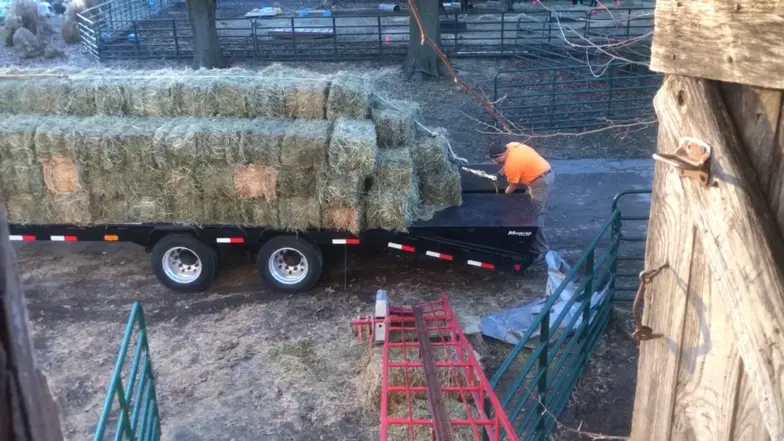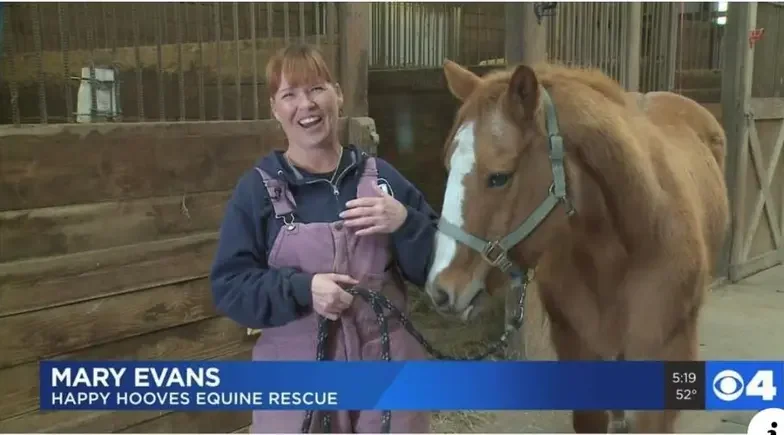They Did It: Facebook Fundraising Success

Workers unload 400 bales of hay that showed up unscheduled a day after the media reported on the rescue's plight.
When Happy Hooves Equine Rescue in Edwardsville, IL, found themselves without the hay needed to feed 22 equines through the winter, they reached out for help online—and were astounded by the support they received.
Happy Hooves was founded in 2014 to provide care, rehabilitation and adoption services for abused, neglected, abandoned and unwanted horses. The rescue accepts horses with physical and emotional issues, as well as horses who are no longer able to perform up to the standards of their former owners. Happy Hooves has found homes for 50 horses with people who love them, are willing to do what is necessary to provide appropriate care for their well-being and give them a second chance at being useful riding horses or even pasture companions.
CEO Mary Evans explains how the rescue raised more than $16,000 in just a few weeks and surpassed her most optimistic expectations. Read what she learned and get ideas for your own successful online fundraiser!
The Need
Happy Hooves currently houses 22 horses on 40 acres of land, so when the rescue’s winter supplier didn’t deliver quality hay, the horses faced a major emergency.
“As we realized the crisis we were in, we reached out to our support network, including Dr. Emily Weiss at the ASPCA,” Evans said. “She suggested we set up a Facebook fundraiser and tap into our local community for support. We rallied the internal troops to brainstorm a plan for how the fundraiser would work and decided on a hay raffle, where anyone who contributed would be eligible to win donated prizes.”
Happy Hooves tallied up how much hay would be needed to last through March and then put an approximate dollar figure on it, which included last-minute pricing and delivery, and listed that as its fundraising goal.
"The people who contact you when you are in your most tired, depleted moments deserve the same kind of deep appreciation and follow-up that the very first donor received."
The Fundraiser
A two-week fundraiser of $15,000 was planned, but Evans thought the rescue would be “very blessed” to get even 5,000.
“Boy, was I wrong! The fundraiser was posted on the morning of Dec. 12, and to my total amazement we raised about $3,000 within the first 48 hours,” she said. “I was humbled and in awe of the generosity of our local supporters.”
And there were more surprises in store. The next day one of the rescue’s volunteers suggested contacting local news media for help. The first news report aired on Dec. 14, and after that the rescue’s plight went viral.
“Our Facebook page exploded with messages and donations every minute of every hour for days on end,” Evans said, and she continued to get offers of hay on her phone from as far as 90 minutes away.
“We had volunteers staffing the Facebook page around the clock, and they helped respond to the phone messages I was inundated with. We made sure to document every single donation that was not made in anonymity, so I could personally follow up with each donor during and after the campaign. I’m still speechless about the outpouring of support that we received from across the country.”
The Result
Happy Hooves received some $16,000 in cash donations, three months of guaranteed hay, an additional 700 likes on its Facebook page, and an offer by a local Missouri businessman to use 200 acres of his land to cultivate the rescue’s own hay in 2020.
Evans cites local media attention and a candid approach about the rescue’s need as reasons for the fundraiser’s success. “This was a true crisis, we were not crying wolf, and we expressed that to our supporters,” she said. “It was a humbling experience to have to admit our predicament, but entirely necessary to be honest about our situation.”
Happy Hooves’ reputation also paid off. “We are by no means perfect and are always learning, especially since this campaign, which has led us to an overall growth spurt. However, even on the rough days, we always put the horses first. Our supporters knew that, which is why they were so generous and shared our campaign on their own personal Facebook pages,” she added.

Interested in doing something similar? Here are some takeaways from Evans:
- Think big (or at least bigger). “We had previously thought that we were too insignificant for the media to care about us. Miracles happen when you give yourself permission to ask for them.”
- Solicit advice and input from the totality of your network, not just those who are nearby. “Reaching out to the ASPCA and to our large volunteer base was key. Everyone was on the same page and rallying behind us.” There may be some off-the-wall ideas, but you never know which one is going to lead to something amazing. “For example, one of our Facebook donors suggested we contact a local retailer, Carol House Furniture, to see how they could help. We did, and they are the business that ended up donating the use of the land for next year’s hay!”
- Log every offer, no matter how big or how small—and respond quickly. Calls and offers came in from Dec. 15 through Jan. 1. “We contacted every single one with at least an acknowledgement within 24 hours of receiving the call or contact. Some people wanted to adopt horses. Some people wanted us to give their raffle prize to a charity. We fulfilled all their requests as soon as we had time, although it did take some weeks to fulfill some of the requests.”
- Continue to express your heartfelt thanks to your followers long after the campaign has ended. When the news stories were running, so many people stopped by to drop off money that it cut into every volunteer’s personal life. “But the takeaway in all of this was that the people who contact you when you are in your most tired, depleted moments deserve the same kind of deep appreciation and follow-up that the very first donor received. Every donor received a personalized thank-you note ... donors without email addresses via got an old-fashioned snail-mailed letter. We constantly reinforced our message that every single one of our donors is always welcome to visit the rescue.”
- Keep your accounting hat on during all the hubbub. Volunteers who are casually involved with the rescue may not understand the rules about directed funds. “I opted to do a special communication about the handing of directed funds to all the volunteers because there were so many spinoff efforts, based on our initial campaign launch.”
- Keep your eyes open for the opportunity to cultivate new people for your long-term donors, supporters and volunteers.
We have lots more on this subject: